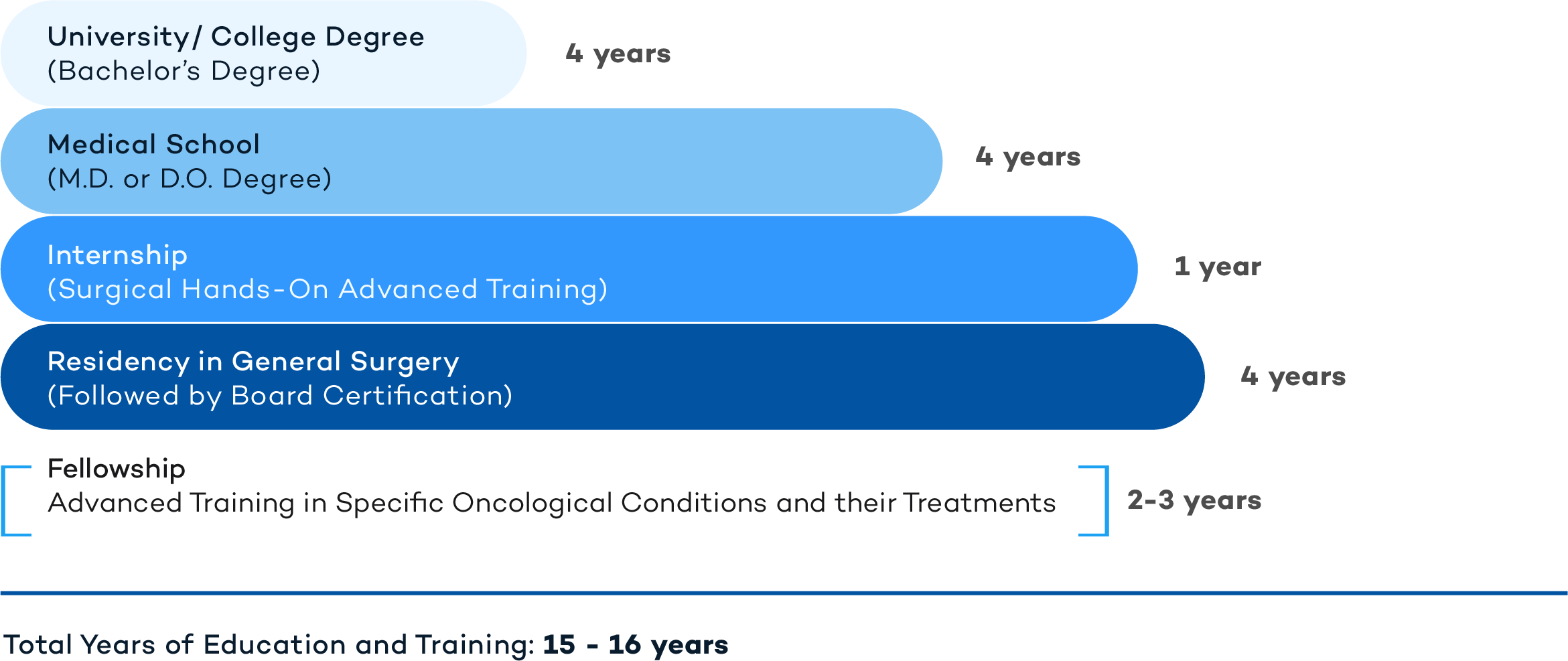

A Surgical Oncologist is a Board-Certified Surgeon who completes a full residency in General Surgery followed by advanced fellowship training in the surgical treatment of many types of cancers or tumors, benign and malignant. These are diseases caused by unregulated and potentially invasive growth of abnormal and genetically damaged cells. Benign tumors are growths that can grow locally and be destructive but generally do not metastasize or spread and are rarely life threatening. In contrast, because of their ability to spread, malignant cancers are potentially life threatening and require immediate medical attention. Another distinction is that after benign tumors are removed, they usually do not recur, while malignant tumors can. Surgical oncologists have specialized expertise in addressing recurrent cancers as well.
Surgical Oncologists are the experts in staging cancers and developing surgical plans to remove the tumors. They work in consultation with Medical Oncologists and radiation oncologist in cases of advanced or invasive disease that may have spread to remote parts of the body or invaded nearby organs and tissues.
The level of expertise and specialization in treating a particular condition as well as the credentials and practice style of the doctor, are important factors in choosing the right surgeon.
Your medical oncologist is often the doctor who will refer you to a surgical oncologist in the event of a cancer diagnosis requiring surgery. You may do your due diligence and check their credentials and practice style with the help of your family and friends. You can also review their bio and hear what other patients have to say about their experience under the doctor’s care on myDoqter.
Surgical oncologists have completed M.D. or D.O. degrees and have advanced residency and fellowship training in surgery. The following graph illustrates the years of education and training that a Surgical Oncologist has undergone.

ONCO from the Greek root ‘óngkos’ for ‘burden, volume or mass’ + LOGY from the Greek word ‘logia’ which means ‘logic’ or ‘the study of’.
Surgical Oncologists have extensive expertise in the surgical treatment of numerous cancers, including:
Breast Cancers: are malignant cell transformations that produce tumors in the breast. They are more common in women, but can occur in men as well. Breast cancer may present as a lump in the breast, bloody discharge from the nipple, or more superficial changes in the shape or texture of the nipple or breast skin.
Colorectal Cancer: is a gastrointestinal cancer of the colon or rectum located at the lower end of the digestive tract.
Endocrine Cancers: are tumors of the endocrine or hormone secreting glands. For example, tumors of the thyroid, the butterfly-shaped gland at the base of the neck, are a common endocrine tumor. They may present with a swelling or lump in the neck called a goiter. Other associated symptoms may include hoarseness or trouble swallowing. Parathyroid Cancer is a rare disease of the parathyroid gland, an organ located in the throat area that is important in the regulation of blood calcium levels. Symptoms can include bone pain, fatigue, and lump in the neck and/or frequent thirst.
Gastrointestinal Cancers: include cancers of the esophagus and stomach. These tumors originate from the cells that form the inner lining of the gastrointestinal tract and often require surgical excision. Presenting symptoms may include unexplained persistent nausea, stomach pain or chronic ulcers, persistent vomiting and/or unintentional weight loss.
Hepato-pancreato-biliary cancers: are tumors that start from the internal liver cells called hepatocytes or from the bile ducts of the liver. Although they may have a variety of causes, they may be associated with hepatitis infections, in particular Hepatitis C. Surgical oncologists also operate on tumors of the pancreas, a hormone gland situated in association with the bile ducts.
Skin Cancers: are a result of abnormal cell growth most commonly arising in the top layer of the skin, known as the epidermis. It is caused in part by unrepaired DNA damage that prompts mutations leading the skin cells to rapidly multiply and form malignant cancers. There may be a genetic or familial tendency to develop skin cancers. The main types of skin cancer are basal cell carcinoma (BCC), squamous cell carcinoma (SCC), malignant melanoma (MM), and Merkel cell carcinoma (MCC).
Sarcomas: are tumors of the soft tissues that may present as growths or nodules in the skin or more internally, in association with muscle tissue.
Ultimately, healthy lifestyles and preventative measures offer the most cost-effective long-term strategy for the fight against cancer. This includes age appropriate cancer screenings as advised by the American Cancer Society in accordance with age and risk factors.
For example, because breast cancer is the most dominant type of cancer in the U.S, the American Cancer Society recommends that women 45 to 49 years old should get mammograms yearly, and leave an open option for woman 40 to 44 to start annual breast cancer screening with mammograms if they wish to do so.
Your primary care physician can counsel you on important information regarding ways to reduce risk factors to prevent certain cancers. Important topics may include:
Make sure to discuss all these options and other preventive medicine recommendations with your doctor.
For more information on Cancer Surgery and Surgical Oncology you can visit the following sites:
https://www.surgonc.org
https://www.cancer.net/navigating-cancer-care/how-cancer-treated/surgery/what-cancer-surgery
https://www.who.int/cancer/prevention/en